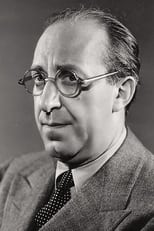Ed Wynn
- Teen actor
Acted in
Boulevard! A Hollywood Story
2021
as Self (archive footage)
Shemp Cocktail: A Toast to the Original Stooge
2008
as Self (archive footage)
That's Entertainment, Part II
1976
as (archive footage)
Hooray for Hollywood
1976
as Self (archive footage)
The Gnome-Mobile
1967
as Rufus
The Daydreamer
1966
as The Emperor (voice)
That Darn Cat!
1965
as Mr. Hofstedder
The Greatest Story Ever Told
1965
as Old Aram
Those Calloways
1965
as Ed Parker
Dear Brigitte
1965
as The Captain
Mary Poppins
1964
as Uncle Albert
The Patsy
1964
as Ed Wynn
For the Love of Willadean
1964
as Alfred
The Hollywood Palace
1964
as Self - Host
The Sound of Laughter
1963
as College Professor
Burke's Law
1963
as Zachary Belden
Son of Flubber
1963
as A.J. Allen
The Golden Horseshoe Revue
1962
as Self
The New March of Dimes Presents: The Scene Stealers
1962
as Self
Backstage Party
1961
as Self
Babes in Toyland
1961
as Toymaker
The Absent-Minded Professor
1961
as Fire Chief
Cinderfella
1960
as Fairy Godfather
Miracle On 34th Street
1959
as Kris Kringle
Startime
1959
The Twilight Zone
1959
as Lou Bookman
The Twilight Zone
1959
as Sam Forstmann
Bonanza
1959
as Professor Phineas T. Klump
Meet Me in St. Louis
1959
as Grandpa
The Diary of Anne Frank
1959
as Albert Dussell
Rawhide
1959
as Bateman
77 Sunset Strip
1958
as Feigenstein
Westinghouse Desilu Playhouse
1958
as Self
The Ed Wynn Show
1958
as John Beamer
Marjorie Morningstar
1958
as Uncle Samson
On Borrowed Time
1957
as 'Gramps' Northrup
Wagon Train
1957
as Cappy Darrin
The Great Man
1956
as Paul Beaseley
Requiem for a Heavyweight
1956
as Army
The Dinah Shore Chevy Show
1956
as Self
Playhouse 90
1956
as Army
The Steve Allen Show
1956
as Self
The 20th Century Fox Hour
1955
as John Hodges
The Wonderful World of Disney
1954
as The Mad Hatter (voice) (archive footage)
The Wonderful World of Disney
1954
as A.J. Allen (archive footage)
The Wonderful World of Disney
1954
as Self
The Wonderful World of Disney
1954
as Alfred
December Bride
1954
as Self
General Electric Theater
1953
as Professor Franz
General Electric Theater
1953
as Max Grossblatt
This Is Your Life
1952
as Self
Hallmark Hall of Fame
1951
as Gramps
Alice in Wonderland
1951
as Mad Hatter (voice)
Operation Wonderland
1951
as Self
Four Star Revue
1950
as Host
The Colgate Comedy Hour
1950
as Self
What's My Line?
1950
as Self - Mystery Guest
The Ed Wynn Show
1949
as Host
The Emmy Awards
1949
as Self
Stage Door Canteen
1943
as Ed Wynn
The Three Stooges: Live and Hilarious
1941
The Chief
1933
as Henry Summers
Turn Back the Clock
1933
as Cigar Store Customer (uncredited)
Hollywood on Parade
1932
as Self
Follow the Leader
1930
as Cricket
Rubber Heels
1927
as Homer Thrush




























































